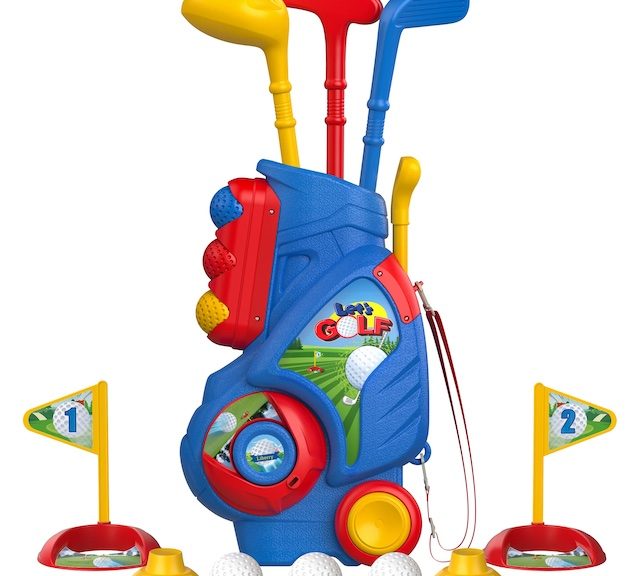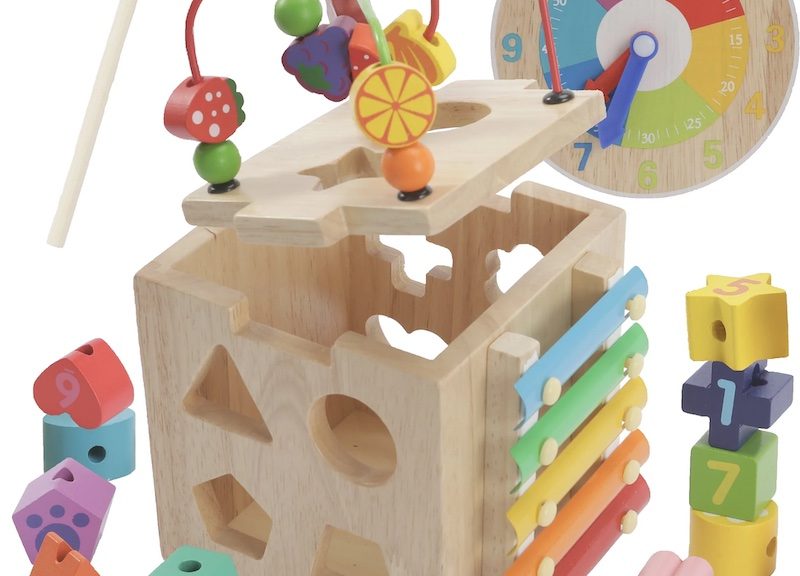Introduction to Toddler Sports Toys
Engaging toddlers in active play is crucial for their growth. Adding sports toys into their playtime mix helps little ones develop physically and cognitively. In this blog, we’ll explore the world of toddler sports toys. These toys are designed to introduce tots to various sports activities, from basketball and soccer to t-ball and golf. We will highlight the developmental benefits of sports toys for toddlers – enhancing motor skills, coordination, and teamwork. Discover our recommended picks, tailored for young children, to support their active lifestyle. Keep reading to learn more about selecting the right sports toys for your little athlete-in-training.
Benefits of Sports Toys for Early Development
Engaging with sports toys is great for toddlers’ growth and learning. Toys like basketball hoops, soccer goals, and T-ball sets do more than just entertain. They help little ones develop key skills. Here are some ways sports toys benefit early development:
- Motor Skills: Playing with a ball improves hand-eye coordination. Throwing, catching, and kicking are all great for this.
- Physical Fitness: Active play gets toddlers moving, which boosts overall health and fitness.
- Social Skills: Many sports toys encourage multiple players. This helps kids learn to share, take turns, and play together.
- Confidence: As toddlers learn a new sport or skill, they feel a sense of achievement. This builds their confidence.
- Concentration: Following the rules of a game and focusing on a goal helps toddlers with attention and staying on task.
- Understanding of Cause and Effect: They learn that kicking a ball hard makes it go far, and gentle taps are needed for control.
All these points show why adding sports toys to playtime is a smart move. They pave the way for a lifetime of enjoying sports and staying active.
Top Picks for Toddler Basketball Sets
Choosing the right basketball set for your toddler can significantly enhance their playtime and development. Here are some top picks that combine quality, safety, and fun, making them standout options for little sports enthusiasts.
Little Tikes Easy Score Basketball Set
This set is ideal for toddlers starting from age 1 to 5. It includes an adjustable basketball hoop, net, and silicone balls. You can adjust the hoop’s height, making it grow with your child. The base fills with sand or water to keep it stable. Its colorful design and soft balls make it a safe, enjoyable choice for indoor and outdoor play.
HYES 2 in 1 Kids Basketball and T-Ball Set
Perfect for versatile play, this set converts from a basketball hoop to a T-ball stand. It comes with basketballs, baseballs, and a bat, catering to varying interests. The set’s adjustability in height caters to kids as they grow. Its sturdy plastic construction ensures durability and safety for young players. The setup is straightforward, and it doesn’t require much space, making it ideal for small play areas.
These sets not only provide hours of fun but also assist in developing motor skills and coordination. They encourage toddlers to be active and can play a vital role in their physical and social development.
Best First Soccer Goals for Toddlers
Choosing the right soccer goal for toddlers is essential for a smooth introduction to soccer. A standout option is the portable mini soccer goal, which is perfect for little athletes. Its lightweight and easy-to-assemble design cater to the playful energy of toddlers and preschoolers. Here’s a look at its benefits:
Pros of the Portable Mini Soccer Goal
- High Portability: Its small size makes it easy to carry and set up anywhere — indoors or outdoors.
- Easy Storage: It folds up compactly and fits into a travel bag for space-saving storage.
- Quick Setup: Pieces click together quickly for hassle-free assembly.
- Perfect for Small Spaces: Ideal for backyards or small play areas without much storage.
- Sturdy Design: Comes with stakes for stability, preventing tipping during play.
Cons of the Portable Mini Soccer Goal
- Size Limitations: Smaller than standard goals, it might not suit older children.
- Assembly Learning Curve: Some parents may need time to get used to the quick-click system for setting it up.
- Single Goal Only: Only one goal is provided, limiting the full soccer experience.
This mini soccer goal encourages sportsmanship and physical activity among young children. It helps develop their kicking skills while ensuring fun and safety during play. A great first soccer goal can ignite a lifelong passion for soccer, making it a wise investment for your toddler’s development and enjoyment.
Recommended T-Ball Sets for Young Children
When choosing T-ball sets, it’s important to consider durability, safety, and the developmental benefits they offer to toddlers. T-ball sets are perfect for introducing children to the basics of baseball while supporting their motor skills and hand-eye coordination. Here are top T-ball sets recommended for young sports enthusiasts:
Little Tikes T-Ball Set
Ideal for children aged 1 to 6 years, this T-ball set includes a sturdy tee, a plastic bat, and a few balls. The size of the bat and balls is perfect for little hands, making it easier to hit the ball. It’s simple to store due to its compact design. However, the balls are quite hard, so outdoor play is suggested.
Pros:
- Easy to assemble and store
- Oversized bat assists in hitting the ball
- Adjustable tee height for growing children
Cons:
- Limited to one color option
- Hard plastic can hurt if not careful
- Height adjustment can be tricky for kids
T-Ball sets like the Little Tikes option offer safe and enjoyable ways for kids to learn the fundamentals of swinging and hitting. They foster a love for the game while helping young ones develop physical skills that will benefit them in other sports as well. Make sure to choose a set that your child can grow into and that can handle the wear-and-tear of active playtime.
Fun Bowling Sets for Toddlers and Preschoolers
Selecting the perfect bowling set can add excitement and a new level of fun to a toddler’s playtime. With the right set, they can enjoy the thrills of knocking down pins while honing their coordination skills. Here’s a look at what makes a great bowling set for your little ones:
The Ideal Bowling Set Characteristics
- Size Appropriate: The pins and ball should fit comfortably in a child’s hands.
- Material Safety: Soft, durable materials work best for safety and longevity.
- Easy To Set Up: A set that’s quick to assemble encourages more spontaneous play.
- Colorful Design: Bright colors and fun themes engage toddlers and preschoolers more.
- Noise Level: Softer sets work well indoors, reducing noise and the chance of damage.
The Melissa & Doug Bowling Set
This delightful animal-themed bowling set by Melissa & Doug is a fantastic choice. It comes with six plastic pins and a bowling ball, all adorned with cute animal figures.
Pros:
- Engages kids with fun animal shapes.
- Includes a carrying case for easy storage.
- Made with durable plastic that survives frequent play.
Cons:
- Comes with only six pins, not the usual ten.
- Can be loud when pins knock together.
- Might wear with intense use over time.
Bowling sets, like the one from Melissa & Doug, promote active play and skill learning for kids. They make for ideal indoor or outdoor activities that keep children entertained for hours. When selecting a set, it’s important to choose one that’s not only fun but also grows with your child as they develop their bowling prowess.
Introduction to Golf Sets Suitable for Toddlers
Introducing toddlers to golf can be a rewarding venture. Golf sets designed for this age group focus on fun while building skills. These sets feature lightweight clubs, oversized balls, and playful designs. They help improve hand-eye coordination and introduce toddlers to the basics of the sport.
The Benefits of Golf Sets for Toddlers
Golf sets for toddlers offer unique advantages. The clubs are sized right for small hands. Larger balls make hitting easier and safer. These sets often include a variety of clubs and colorful balls. Some come with putting mats for indoor play. They are a great way to get toddlers interested in golf.
Choosing the Right Toddler Golf Set
Look for sets with child-friendly grips and easy assembly. Safety is key, so choose sets with soft, non-toxic materials. Select sets that are robust but light enough for toddlers to handle. Make sure the set is adjustable, to grow with your child. A set with a carrying case or bag adds convenience for storage.
Golf sets for toddlers are more than just toys. They’re tools that shape vital developmental skills while ensuring safety and enjoyment. By choosing the right golf set, you give your child a head start in golf and other coordinated sports.
Tips for Choosing the Right Sports Toy
Selecting the right sports toy for your toddler involves several key factors. Consider these tips to ensure you make a choice that benefits your child’s development and maximizes their playtime fun:
- Age Appropriateness: Look for toys that match your toddler’s age. Check the manufacturer’s recommended age range.
- Safety First: Ensure the toy meets safety standards. Avoid small parts that could be choking hazards.
- Interest-Based Selection: Choose a sports toy that aligns with your child’s current interests to keep them engaged.
- Growth Potential: Pick toys that grow with your child, ones with adjustable features or multiple difficulty levels.
- Quality and Durability: Opt for toys made with high-quality materials. They should withstand rough play and outdoor elements.
- Size and Space: Consider the size of the sports toy and the space available at home or in the yard.
- Easy to Set Up and Store: Avoid complex setups. Toys should be easy to put away after playtime.
- Encourage Variety: Diversify your toddler sports toys to expose them to different activities and skills.
- Educational Value: Think about what the toy teaches. Does it improve motor skills, coordination, or social abilities?
- Reviews and Recommendations: Read reviews from other parents or ask friends for their thoughts on the sports toy.
By keeping these considerations in mind, you can choose a sports toy that keeps your toddler active, helps with their development, and can be enjoyed safely and comfortably.
Conclusion: Enhancing Toddler Fun and Learning Through Sports Toys
As we wrap up our guide on toddler sports toys, it’s clear these toys are more than just fun. They are fundamental tools that enhance your child’s physical, social, and cognitive development. By incorporating toddler sports toys like basketball sets, soccer goals, T-ball sets, bowling sets, and golf sets into their playtime, toddlers gain essential skills. These include motor skills, teamwork, social interaction, and a basic understanding of sports.
Choosing the right sports toy involves considering your child’s interests, the toy’s safety, and its educational value. Toys that grow with your child offer lasting benefits. Also, ensure that these play items are sturdy, safe, and age-appropriate.
Active play with toddler sports toys not only keeps toddlers engaged but also lays the groundwork for a healthy lifestyle. Encourage your child to explore different sports toys to find their interests. This exploration helps in building a rounded skill set and nurturing a passion for sports from a young age.
Remember, the key to choosing the best sports toy is not just about fun. It’s about enriching your child’s development and making playtime a valuable part of their growth and learning journey.







